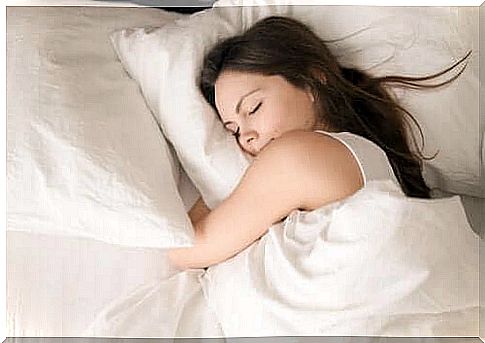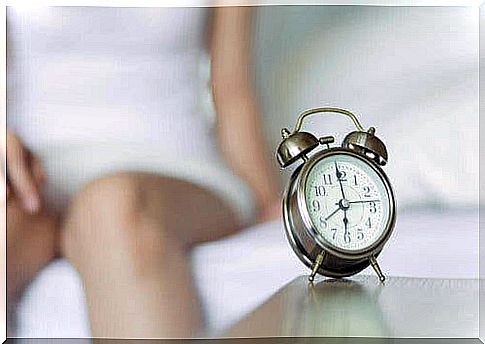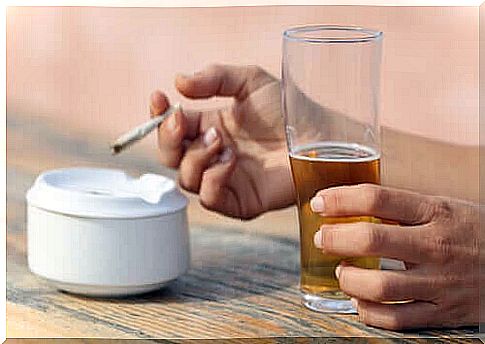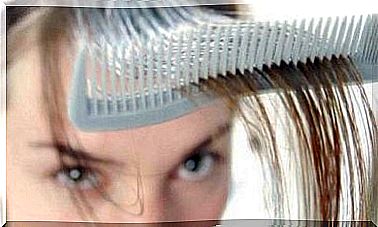What You Do During The Day Affects Your Sleep

Sleeping well is important for the human body to function at its full potential. When we are not able to do that, we can desperately try to use some rest strategies focused on the time we are trying to sleep. What you do during the day affects your sleep and has a huge impact on the way we sleep… maybe even more than what we do at night.
What you do during the day affects your sleep
Sleeping is a basic physiological process that aims to maintain the proper functioning of our body. It is a biological necessity with a goal to:
- Restore cell energy so that our cells are oxygenated and regenerated.
- Restore homeostasis in the central nervous system and other body tissues to preserve health so that they can function properly.
It is therefore important to sleep well to:
- Regulate our emotions.
- Ensure adequate learning and memory processes.
- Maintain an optimal body weight.
- Regulate our internal temperature.
- Optimize the production of hormones.
- Keep our heart health in top shape.

What happens when we do not sleep well?
Based on the information above, it is easy to understand that your cells weaken and that your body begins to fail when you do not sleep well. This loss of functionality may be due to:
- Confusion, apathy and irritability – We simply feel generally uncomfortable.
- A deficit in concentration, memory and learning – We notice a decline in our intellectual performance.
- Fatigue and weakness – We have less energy during the day.
- Increase in body fat – We gain weight.
- Blurred vision and photosensitivity – Our vision worsens.
- Gastrointestinal problems – There is a higher risk of constipation, diarrhea and accumulation of gas.
- Premature aging and reduced life expectancy – Various long-term health problems arise.
Things to do during the day to encourage good sleep
In general, we tend to think, seek and implement measures to deal with our sleep problems just before bedtime when we are unable to sleep. However, many of us forget that what we do during the day has a lot to do with what happens at night. We will therefore give you some advice on what you can do during the day to enjoy an adequate night’s sleep.
What you do during the day affects sleep: Plan when you will sleep and wake up
When we are not allowed to sleep, we enter a vicious circle where we may go to bed early, but get up late. Thus, one of the first steps to sleeping well is to set a specific time for when to go to bed and wake up. Note that you will be very tired the first day.
In this way, you can notice that the sleep quality is best between kl. 23:00 and at 09.00 This means that you should be awake outside this time slot to maximize your nightly rest.
This is because our metabolic conditions (the release of brain neurotransmitters, central temperature, melatonin levels, metabolic rate and brain activity) are ideal for producing and fulfilling our daily functions during this time period. The body is programmed to be awake and active outside of this time frame.
We should therefore choose to go to bed and wake up within the mentioned time slot. It is recommended that adults sleep between 7 and 9 hours each day.
You should also wake up and go to bed at certain times on the weekends, although these days are often used to socialize and celebrate. Thus, it can be difficult to respect the established schedule. Unfortunately, the more you deviate from it, the worse your sleep quality will be for the rest of the week.

What you do during the day affects sleep: Increase the amount of physical activity
Most people who are unable to get a restful sleep feel very tired during the day. No wonder: The human body needs energy to maintain its vital functions.
Lack of sleep reduces the energy available for the activities that are not essential for survival. Thus, we are forced to stick to the activities that are important to us.
It therefore becomes more difficult to follow up on everything else. We have then been so inactive during the day that we do not want to sleep when it is time to go to bed. This is because our body does not need sleep.
As you can see, we are gradually changing our internal clock, the one that regulates when we should sleep and when we should be active. The less we sleep, the more inactive we become. And the more inactivity, the more insomnia. In the end, we end up normalizing a pattern that is not healthy at all.
The key to changing this cycle is physical activity. An active lifestyle is the key to good sleep.
Do not take a nap during the day
As we said above, we need to be awake and active during the day so that we are relaxed and can sleep all night. Avoiding a nap is therefore a basic measure for many. The more we sleep during the day, the less we will sleep at night.
However, taking a nap can help you feel better after a bad night. In fact, a study published by the Journal of Neurology in 2016 found that people who took a nap after a night of less than 7 hours of sleep improved their sense of well-being by 20%.
Maintain a varied diet throughout the day
Maintaining a varied and healthy diet can improve our sleep quality. This is because we guarantee the proper contribution of micronutrients needed to maintain the integrity of the central nervous system as well as to produce appropriate neurotransmitters.
In this sense, our main goal should be to ensure an adequate intake of tryptophan. This is a precursor of serotonin, also known as the wellness hormone, and melatonin, the sleep hormone. We also need an adequate intake of carbohydrates to increase the bioavailability of tryptophan in the central nervous system.
In addition, we must get enough omega 3, magnesium, zinc, calcium and vitamin B. This makes the muscles relax and contributes to the proper formation of the neurotransmitters involved in the sleep process.
Avoid tobacco and alcohol before going to bed
Recent research indicates that smoking or drinking alcohol within 4 hours before bedtime changes our sleep process. As a result, we may wake up tired.
Similarly, tobacco is a stimulant that activates the central nervous system. This is the opposite of what we want to happen during the last hours of the day.
Why?
Melatonin, the sleep hormone, is released only during relaxation.
Similarly, alcohol is a depressant. However, alcohol changes the REM sleep phase when consumed during the last hours of the day. REM is the stage where our brain decides which information to store and which to reject.

What you do during the day affects sleep: Do not drink coffee too late
Coffee, tea and cocoa contain caffeine and theobromine, and we know that these are stimulants. You should therefore avoid drinking them after 17.00. Note that this measure may not be enough for those who are still stimulated twelve hours later.
Keep electronic devices away from your bed
The use of electronic devices during the last 4 hours before going to bed is also a no-no.
The blue light from this type of monitor activates the photoreceptors in the retina. Then these errors send a message to the brain; that it’s time to wake up. In addition, the same area of the brain that is activated after a shock is stimulated. This increases the level of cortisol, the stress hormone, and inhibits the production of melatonin, the sleep hormone.
Needless to say, your health should be the most important thing of all. If for some reason you find it impossible to live without your mobile phone, tablet or computer during the last hours of the day, you can adjust the settings. There is a way to make the light on most of these devices yellower.
Do not exercise at the end of the day
Physical activity during the last hours of the day increases cortisol levels and therefore inhibits the release of melatonin. As we mentioned above, this is important for proper sleep.
The best dinner you can eat that does not affect sleep
The optimal dinner for proper night sleep has a low fat content. It contains carbohydrates, is rich in protein and does not contain overly spicy or sugary foods. You must eat this meal at least two hours before bedtime.
This is because fat, sugar and spices activate your metabolism and you try to do the opposite. Similarly, it is important to eat at least two hours before going to bed. When you lie in bed, your body will function at its minimum so that you can sleep properly.
Similarly, high glycemic carbohydrates generate an insulin peak that helps increase the level of tryptophan to the central nervous system. Due to the negative effect overstimulation of the pancreas has on the release of insulin, this measure requires a prior assessment of the risks and benefits.
Melatonin-rich foods such as cherries, oatmeal and bananas can reduce the time it takes to fall asleep and help you maintain sleep overnight.
Remember that what we do during the day is important for a good night’s sleep. In reality, it is quite simple: Be active, stay away from stimulants and follow a healthy diet.









